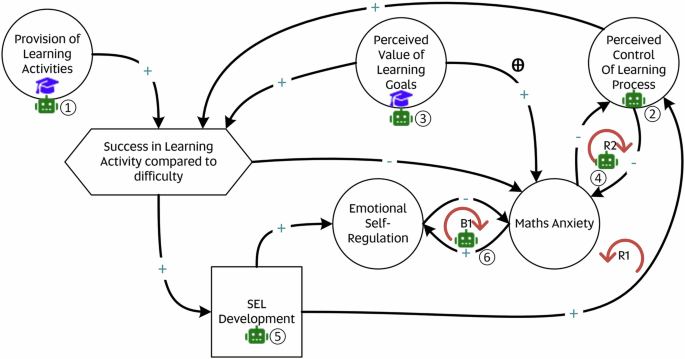Revolutionizing Education: The Role of AI in Social-Emotional Learning
As we navigate the complexities of modern education, Artificial Intelligence (AI) is emerging as a transformative force with the potential to enhance learning experiences. Figure 1 illustrates how AI can significantly contribute to social-emotional learning (SEL) while facilitating feedback loops associated with emotional development. This article explores the multifaceted roles of AI in education, emphasizing its capacity to personalize learning, support emotional well-being, and foster resilience among students.
Understanding the Cyclical Nature of Learning
At the heart of effective education is the understanding that learning is not a linear process. Rather, it is cyclical, with each educational experience leading to changes that can inform future learning. The model presented in Figure 1 captures this complexity, noting that successful learning experiences pave the way for further growth, while challenges help develop resilience. This dual nature—success and difficulty—triggers different emotional responses, thus shaping a student’s learning journey.
The Role of AI in Educational Feedback Loops
AI has the potential to mediate both balancing and reinforcing feedback loops within educational systems. It can facilitate personalized interactions, whether through autonomous AI agents or supervised settings where technology collaborates with educators. The aim is to enhance emotional engagement without undermining the role of teachers, ensuring that AI acts as a supportive tool rather than a replacement.
Targeting Areas for AI Implementation
From our conceptual model, we propose six primary areas where AI can bolster the learning process. Each area serves as a focal point for exploring how AI strategies can improve educational outcomes. Specific elements for research and enhancement are outlined in Table 1, showcasing the various design goals achievable through AI integration.
Personalization of Learning Activities
One of the most promising applications of AI lies in its ability to personalize learning experiences. By analyzing vast amounts of data, AI can tailor mathematical learning activities to align with the cognitive abilities of each student. This adaptability minimizes frustration and enhances the likelihood of success. For instance, AI can suggest personalized pathways that dynamically adjust task complexity, ensuring that students are continually challenged yet supported.
Supporting Emotional Feedback
AI doesn’t merely focus on task completion; it can also offer emotional feedback. By recognizing signs of frustration or disengagement, AI-driven systems can highlight students’ progress and efforts. This form of positive reinforcement fosters a growth mindset, encouraging students to view setbacks as opportunities for learning rather than failures.
Enhancing Student Agency
AI algorithms can significantly enhance learners’ perceptions of agency and control. By providing students with a range of recommended next steps tailored to their learning needs, AI encourages self-monitoring. This empowers students to take charge of their educational journeys, enhancing motivation and engagement.
Value Induction in Learning
AI can also assist educators in enhancing value induction, a crucial aspect of learning success. By utilizing vast databases, AI can present real-world applications of mathematical concepts that resonate with individual students. This approach helps students appreciate the intrinsic value of the knowledge they acquire, making learning more relevant and meaningful.
The Rise of Chatbots in Education
Chatbots, powered by large language models (LLMs), are becoming increasingly effective in educational settings. These AI tools can facilitate moderated feedback loops, helping students reflect on their learning experiences without falling prey to unhelpful self-talk. By reframing reflections, chatbots encourage students to consider their overall development, thus reducing the binary focus on success versus failure.
Redefining Failure and Success
AI interventions can also play a critical role in redefining students’ perceptions of failure and success. By promoting personal micro-targets, AI can shift focus from immediate performance to deeper learning goals. This change in mindset helps students view challenges as growth opportunities, thereby alleviating anxiety associated with performance.
Limitations of Current AI Tools
Despite its potential, current AI tools often struggle to address the emotional and cognitive needs of students adequately. Many AI models focus on the mechanics of teaching rather than the human aspects of learning. To truly harness AI’s potential, future research must prioritize emotional well-being and intuitive understanding over mere efficiency.
The Need for Emotional Regulation
The ability to self-regulate emotions is crucial for managing challenges like math anxiety. Advanced natural language processing algorithms could be developed to detect emotional cues in student responses. Combining this with multi-modal learning analytics—tracking non-verbal cues such as facial expressions—could provide comprehensive support for emotional moderation.
Building Resilience through AI
Incorporating AI into educational frameworks offers an unprecedented opportunity to enhance resilience among students. By providing personalized feedback and emotional support, AI can help students navigate challenges more effectively, fostering a resilient mindset that prepares them for future obstacles.
Collaborative Learning Environments
AI can also cultivate cooperative learning environments. Interactive platforms powered by AI can encourage collaboration among students, allowing them to explore mathematical concepts while engaging in problem-solving activities. This cooperative approach not only enhances understanding but also nurtures social interactions, further enriching the educational experience.
The Future of AI in Education
As we look towards the future, the intersection of AI and education presents vast possibilities. By focusing on emotional well-being and personalized learning, we can create educational environments that not only teach academic content but also nurture the whole student.
Research Goals for AI Development
Researchers must aim to develop AI systems that foster a deeper understanding of mathematical concepts and emotional regulation. This requires innovative approaches that prioritize the human experience in learning, ensuring that educational tools enhance both cognitive and emotional growth.
Conclusion: A New Era in Educational Technology
In conclusion, the integration of AI into education signals a new era of personalized learning and emotional support. By embracing AI’s potential to enhance social-emotional learning, educators can create more engaging, supportive, and effective learning environments. As we continue to explore this exciting frontier, the goal remains clear: to empower students, enrich their learning experiences, and foster resilience in an ever-changing world.








